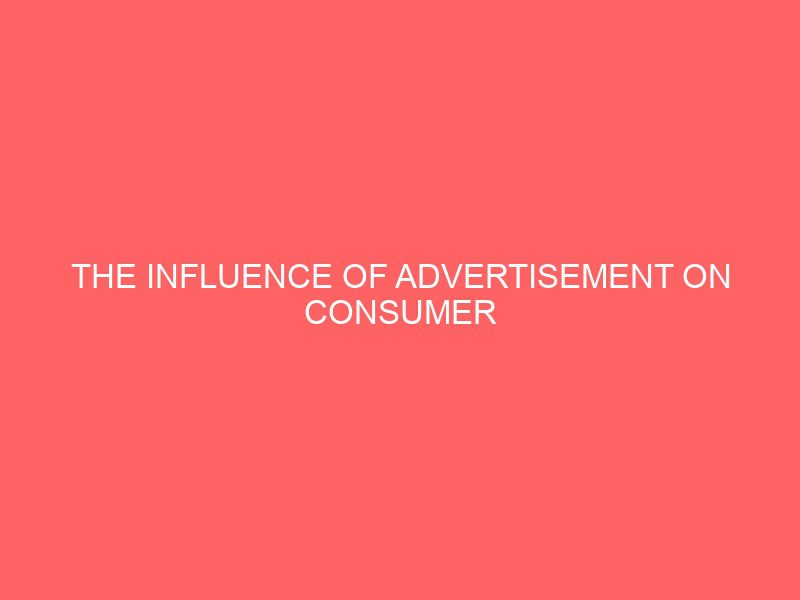Description
CHAPTER ONE 1.0 INTRODUCTION 1.1 BACKGROUND OF THE STUDY All over the world people and companies utilize advertising to good advantages in the keen competition encounter in word regional and local markets, business men are aided by the sales producing force of advertising. Not only that skillfully planned and directed advertising not only at home but also abroad over come prejudice combat, foreign competition, establish new habit, build good will creates employment increase productivity multiply sales and thus, lay a solid foundation for sustained economic development of any country, one analysis contend that advertising is one of the most powerful socializing force in culture. Advertising sells more than product. It sets image, value, goods and concepts of who we are and who we should be. It shapes our attitudes and our attitudes shape our behaviour. Ahunaya (2004). Advertising power goes beyond the selling of goods, it promotes a consumer life style a global culture that centers on material things. A television commercial normally say?s and now a few words from our sponsors? are companies or individual that pay to have their product advertised, while the ?few words our sponsor? sponsors are companies or individual that take pay to have their product to be advertised, while the ?few words our sponsor? have become a deluge sponsor still financially support the newspaper and radio. According to the Encyclopedia, American (204) Advertising began around 3200 BC when the Egyptian stenciled insertion the names of kings on temple being built. Later they wrote run way slave enouncement on Papyrus- sign boards were placed outside doors in Greece and Egypt around 1500 B. c perhaps the most important Event in history of advertising was the printing of the Gutenberg Bible about 1450 to 1455. The first time that western man used the principle of moveable type in about 1477 in London, the first printed advertisement in English announced a prayer book sale the first newspaper advertisement appeared on the back paper of in London newspaper in 1625. The easily town crier was also a medium of advertising?. Advertising has since then been seen to help in economic development in ways of creating jobs sponsoring sports, and the art helps to provide affordable media which encourages competition improves product keep price low and enable people to make informed buying choices Eluwa (2005: 44). According to Rosson Blatt (1977) advertising is the voice of business such that when it is heard, business is said to have been spoken. All over the world today, advertising seems to have been recognized as an important tool, which facilitates the sale of products and strengthens consumer?s preferences. Manufacturers who continuously work for the sale of their product tends to see advertising as an indispensable tool. In Nigeria for instance, advertising has been employed vigorously on non-price completion to promote the image of competing product brands. This largely had to the establishment and growth of many industries of which Pepsi plc was not left out. Fortune started to smile to these companies at most Nigerians started consuming their product and this accounted for the existence of many more of such companies in the country. However, with the recent down ward changes in the economics fortune of the nation and her people those Pepsi companies are being faced by declining patronage to scramble for consumers whose finances and depressed and this in turn has led to stiff competition and cutthroat advertisement as each manufacturer of different brands of Pepsi wants to outdo the other to gain control of a large sparer of the market in order to sustain itself in business. As a result of the need to communicate to the consumers? information about a particular products personality and features becomes imperative the manufactures in order to accomplish the task of reaching the consumers uses advertising to inform them about the product, the charges it has made and persuade them to buy the products. However, manufacturers cannot win the consumers over successfully, or make them prefer their brand of product if the brand does not live up to the expectation of the products advertisement Haller (1977) criticized the power of advertising ?claims? in selling a product. He observed that when the product feature seem very small or the claims exaggerated the consumer may change his or her mind not to by that brand anymore he further remarked that a product will only remain the darling of the consumers, if it matches up to the claims in the advertisement and meet the consumers taste, needs and expectation. Other critics of advertisement uphold that adverts hamper consumer choice as large advertiser uses their power to limit the options to a few will advertised brands. However, consumer choice and preferences for brands may be informed by a combination of varied factors including advertising. This study seeks to examine primarily the impact of adverts and other factors such as quality, price, proximity, availability group influence est. has on consumer purchasing behaviour thus the main question is can adverts influences the consumer and make him or her switch from one brand to another. 1.2 STATEMENT OF THE RESEARCH PROBLEM Critics claim that advertising manipulates us into buying things by playing on our emotions and promising greater status social acceptance and sex appeal there is no doubt about the fact that this new and other like it would advertise affect the consumers. Historically, companies and even professional advert people have questioned or misunderstand the effectiveness of advertising series of market research studies however offered dramatic evidence to the contrary the evidence includes better awareness familiarity and overall impression of products. ABSTRACT Advertising as a major means of selling goods, product and services in Nigeria and all over the world is faced with lots of challenges owing to the development of advertising in Nigeria and challenges associated with rending services customers have so many complaints ranging from awareness to feedback. Therefore, this study is an attempt to examine critically the rate of influence of advertisement on the purchase of minerals by consumers. To determine the rate at which they are influenced by advertisement and to determine the level of acceptance of advertisement aired. 1.3 OBJECTIVES OF THE STUDY The study had the following objectives 1. To determine the role of advertisement in marketing of consumer goods 2. To understand consumers? views and or opinions towards advertisement of consumer products in general and Pepsi in particular. 3. To measure the extent to which advertisement influences the behavior of consumers of Pepsi. 4. To ascertain if a consumer good can overcome competition without advertisement 5. To determine if advertisement increases consumer?s preference of a particular product to others 6. To ascertain which medium of advertisement will make greater impact in advertisement of consumer goods Finally this study will proffer solution on most effective means of handling advertisement to meet modern day challenges as well as handle some peculiar circumstances 1.4 RESEARCH QUESTIONS 1. Is advertisement an effective tool in marketing of Pepsi bottling company products or just a mere exercise? 2. To what extent do other promotional activities undertaken by the company impact positively on the consumers of the product? 3. Are there steps taken to ascertain the impact of advertisement on the purchase of Pepsi bottling company by consumers? 4. Has advertisement improved consumer preference for the Pepsi bottling company products? 5. Has the company been able to overcome competition through advertisement? 1.5 SCOPE OF STUDY This study is focused on the influences of Advertisement on the purchase of mineral products. This study is centered on the Pepsi bottling company products. 1.6 SIGNIFICANCE OF THE STUDY This work though not exhaustive is quiet necessary at a time the media an awash with all forms of advertisement lure consumers. It will educate consumer on the best ways to respond to advertisement while advertisers will learn to understand the need to follow the ethics of the profession by avoiding advertisement that are subversive. Students of advertising will also find this work useful as it will expose them to various forms of media advertisements. Above all, this study will serve as an addition to existing literature on the topic it is expected that researches will find some of the recommendation of this work useful in conducting further research.








